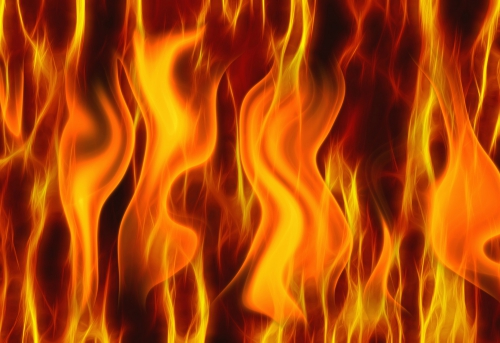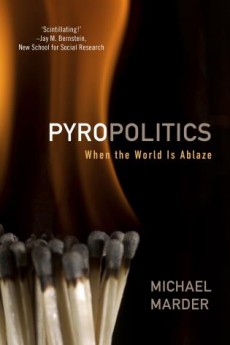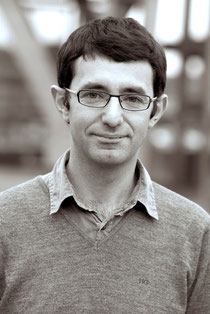
The Era of Pyropolitics is Coming
By Robert Steuckers What
do political scientists mean when they talk about “pyropolitics”? There
are two sources to explore in order to understand what they mean;
first, you’ll have the whole realm of political theology to investigate,
including Donoso Cortés’ thoughts about liberalism, socialism and
Catholicism (this last being perceived as Tradition as such) and of
course you’ll have to study thoroughly the core idea of Carl Schmitt,
having proved that all political ideas have a theological background;
second, you’ll have to take into consideration Schmitt’s perception of
world politics as a clash between raw elements such as Earth and Water.
Real politics, called in his genuine German as “das Politische,”
is necessarily Earth-bound, continental and the truly efficient
political man is a kind of Roman geometer who organizes the territory
coming under his jurisdiction, by simply measuring it.
What
do political scientists mean when they talk about “pyropolitics”? There
are two sources to explore in order to understand what they mean;
first, you’ll have the whole realm of political theology to investigate,
including Donoso Cortés’ thoughts about liberalism, socialism and
Catholicism (this last being perceived as Tradition as such) and of
course you’ll have to study thoroughly the core idea of Carl Schmitt,
having proved that all political ideas have a theological background;
second, you’ll have to take into consideration Schmitt’s perception of
world politics as a clash between raw elements such as Earth and Water.
Real politics, called in his genuine German as “das Politische,”
is necessarily Earth-bound, continental and the truly efficient
political man is a kind of Roman geometer who organizes the territory
coming under his jurisdiction, by simply measuring it.After both German defeats in 1918 and 1945, Earth is no longer the core element of world politics. It has been replaced by Water: it’s the new subversive and destructive dialectics of “Land und Meer,” of Land and Sea, whereby Water obtains victory in the end. Schmitt’s posthumously edited diary Glossarium insists heavily on the destructive effects of the victorious all-encompassing US-“hydropolitics.” “Pyros” means “fire” in Greek and represents, according to Michael Marder (cf. infra), another raw element combining not only the idea of a devouring/burning flame but also the corollary ones of “light” and “warmth.” Even if Schmitt reduced the possibilities of politics to two main elements (Earth and Water), this does not mean that Fire or Air didn’t exist and didn’t play a role, even less perceptible. “Fire” means therefore several phenomena: the burning force of destruction (that you find in anti-traditional revolutions), the “light-without-warmth” of Enlightenment, or the warmth of silent revolt against untraditional (abstract) institutions derived from several ideological strands of the 18th-century Enlightenment.
As no virgin territories can be conquered anymore (see Toynbee’s thoughts) and subsequently organized according to the very earth-bound principles of Roman geometers, the Earth as structuring element of true politics is gradually replaced not only by Water but also by Fire. Water, as the emblematic element of liberalism, Manchesterism, seapower, or plutocracy, doesn’t know neither clear borders nor positive rest (those who rest on sea sink and are drowned, said Schmitt in his Glossarium). No “otium” (fruitful rest, introspection, meditation) is possible anymore, only “neg-otium” (febrile nervosity of restless materialistic activities) survives and thrives. We live then in societies where only ceaseless acceleration (“Beschleunigung”) rules and cancels all sensible attempts to decelerate things (Ernst Jünger’s brother Friedrich-Georg was the main theorist of “deceleration” or “Entschleunigung,” true ecological thinking being an awkward attempt to bring back the raw element Earth on the world political stage). Domination of hydropolitics (seapower) leads to border dissolution, as we clearly can observe nowadays, and to a worldwide preponderance of economics and anti-political/anti-telluric/anti-traditional rules of moralistic law (e.g. Wilsonism).
Nevertheless, even as a dominated element, Earth cannot be simply wiped out and remains currently silent, as if it were deeply wounded and hibernating. Hydropolitical forces should therefore try other means to destroy definitively the tacitly resisting element Earth and, subsequently, to provoke explosions on the continent, i.e., mobilize Fire as an adjuvant, a Fire they don’t manipulate themselves but leave to mercenary forces hired secretly in countries with a surplus of young jobless men to do the dirty work. The apex of sea and air power could be observed after the destruction of Saddam Hussein’s Iraq in 2003, without the complicity of allies and aliens (the Paris-Berlin-Moscow Axis). The war against Baathist Iraq didn’t result in a complete victory of the neocon aggressors. Sea powers, as they aren’t earth-bound powers, are reluctant to organize occupied areas like Roman geometers did. Therefore, to keep the defeated and destroyed countries in a state of total dereliction, hydropolitical powers mobilized the element Fire, i.e., terrorism (with its strategy of blowing up people and buildings and its ardent religious fanaticism, “ardent” being derived from the Latin “ardere,” meaning “to burn”). The recurrent terrorist attacks against Baghdad’s Shiite marketplaces are the most appalling actions in this return of violent pyropolitics. The same pattern of total destructive violence would be used later in Libya.
When no geometer’s skills are available and when there is no desire to create a new statehood to replace the broken one, we observe a transition to pyropolitics. The Earth-bound Baathist military elite of former Iraq itself turned also to pyropolitics by partly creating ISIS, that spread in the neighborhood, while being at the same time a revolt against the chaos generated by the neocon Bush war and a manipulation of hydro/thalassopolitical secret forces to set undesirable countries ablaze and eventually spread the devouring terrorist/fanatical Fire to the main competitors’ territories (to Europe as a harbor for refugees among whom terrorists hide and to Russia where Chechen and Daghestani terrorists are directly linked to the Wahhabite networks). The hydro/thalassopolitical strategy to set whole areas ablaze by stirring up revolts, religious hatred, and tribal enmities is surely not new but has recently taken new more gigantic dimensions.
picture: Prof. Michael Marder - http://www.michaelmarder.org/
 ISIS’
pyropolitics has as a collateral effect to ridicule the
“light-without-warmth” Enlightenment ideologies of the Eurocratic
elites. Light alone blinds and doesn’t produce genuine solutions for new
problems that were induced by the disguised foe’s hydro- and
pyropolitics. A blinding political ideology determined by light alone —
that is also bereft of any “warmth-giving” feelings of security — is
obviously bound to fail. European states become gradually failed states
because they keep to “light-only-ideologies,” being only weakly
challenged by so-called “warmth-demanding” populist movements. Europe is
now undergoing a double aggression under two threats: the one of
“light-without-warmth” ideological systems – leading to what Ernst
Jünger defined as “post-history” — and the one of imported pyropolitics
from the Muslim world formerly set ablaze by several factors, among
which the total destruction of Saddam’s Iraq is the most important.
ISIS’s pyropolitics aims at setting ablaze the Western European
countries held erroneously responsible for the complete collapse of
Near- and Middle Eastern countries. ISIS’ pyropolitics is nevertheless a
quite complex problem: the religious element in it rebels savagely
against the “light-only” all determining Western and global dominant
ideology and promotes a pyropolitical “warmth-based” alternative exactly
like a European counterpart of it would also aim at replacing the
old-fashioned and bleak “light-only” ideological nuisances by more
open-hearted and warmer political systems. The neoliberal avatar of the
“light-only” ideology should therefore be replaced by a “warmth-giving”
solidarism, i.e., a socialism that should have lost all the “coldness”
that was attributed to Soviet or French communism by Kostas Papaioannou,
a voice of Communist internal criticism in the ’60s and ’70s in France.
ISIS’
pyropolitics has as a collateral effect to ridicule the
“light-without-warmth” Enlightenment ideologies of the Eurocratic
elites. Light alone blinds and doesn’t produce genuine solutions for new
problems that were induced by the disguised foe’s hydro- and
pyropolitics. A blinding political ideology determined by light alone —
that is also bereft of any “warmth-giving” feelings of security — is
obviously bound to fail. European states become gradually failed states
because they keep to “light-only-ideologies,” being only weakly
challenged by so-called “warmth-demanding” populist movements. Europe is
now undergoing a double aggression under two threats: the one of
“light-without-warmth” ideological systems – leading to what Ernst
Jünger defined as “post-history” — and the one of imported pyropolitics
from the Muslim world formerly set ablaze by several factors, among
which the total destruction of Saddam’s Iraq is the most important.
ISIS’s pyropolitics aims at setting ablaze the Western European
countries held erroneously responsible for the complete collapse of
Near- and Middle Eastern countries. ISIS’ pyropolitics is nevertheless a
quite complex problem: the religious element in it rebels savagely
against the “light-only” all determining Western and global dominant
ideology and promotes a pyropolitical “warmth-based” alternative exactly
like a European counterpart of it would also aim at replacing the
old-fashioned and bleak “light-only” ideological nuisances by more
open-hearted and warmer political systems. The neoliberal avatar of the
“light-only” ideology should therefore be replaced by a “warmth-giving”
solidarism, i.e., a socialism that should have lost all the “coldness”
that was attributed to Soviet or French communism by Kostas Papaioannou,
a voice of Communist internal criticism in the ’60s and ’70s in France.But there is also a savage, destroying “flame-like” aspect in pyropolitics: the burning fire of explosions and machine-gun fire (like in Paris and Brussels) and of some public executions by fire in ISIS-occupied Syria, aiming at sparking fear in Europe through the media effect it has inevitably had. The use of such dimensions of pyropolitics is a declaration of war to the rest of the world, which is set as a worldwide realm of total foes (Dar-el-Harb), what cannot be accepted (as you are inevitably the foe of all those who declare you a foe, as Carl Schmitt and Julien Freund used to stress it very clearly in their works). No one can accept such a radical and fierce rejection without automatically negating themselves, their very right to live. The problem becomes still more acute as the whole system set up by the “light-without-warmth” ideology (Habermas) doesn’t accept the polemical idea of the “enemy.” In the eyes of Habermas’ followers, there is never an enemy, there are only discussion partners. But if the partners refuse to discuss, what happens? Clash is then inevitable. The dominating elite, as followers of poor silly Habermas, don’t have any response to the challenge. They will have to be replaced. It will be the difficult task of those who remember Schmitt’s and Freund’s lectures.
Robert Steuckers
Forest-Flotzenberg, May 2016
Forest-Flotzenberg, May 2016
Source: Michael Marder, Pyropolitics: When the World is Ablaze (London: Rowman and Littlefield, 2015).
Further readings (articles of Prof. Michael Marder):
"The Enlightenment, Pyropolitics, and the Problem of Evil," Political Theology, 16(2), 2015, pp. 146-158.
"La Política del Fuego: El Desplazamiento Contemporáneo del Paradigma Geopolítico," Isegoría, 49, July-December 2013, pp. 599-613.
"After the Fire: The Politics of Ashes," Telos, 161, Winter 2012, pp. 163-180. (special issue on Politics after Metaphysics)
"The Elemental Regimes of Carl Schmitt, or the ABC of Pyropolitics," Revista de Ciencias Sociales / Journal of Social Sciences, 60, Summer 2012, pp. 253-277. (special issue on Carl Schmitt)
Note à l'attention des lecteurs:
La version originale de ce texte est anglaise et a paru pour la première fois le 6 mai 2016 sur le site américain (Californie): http://www.counter-currents.com dont le webmaster est Greg Johnson qui a eu l'amabilité de relire ce texte et de le corriger. Merci!
Commentaires
Enregistrer un commentaire